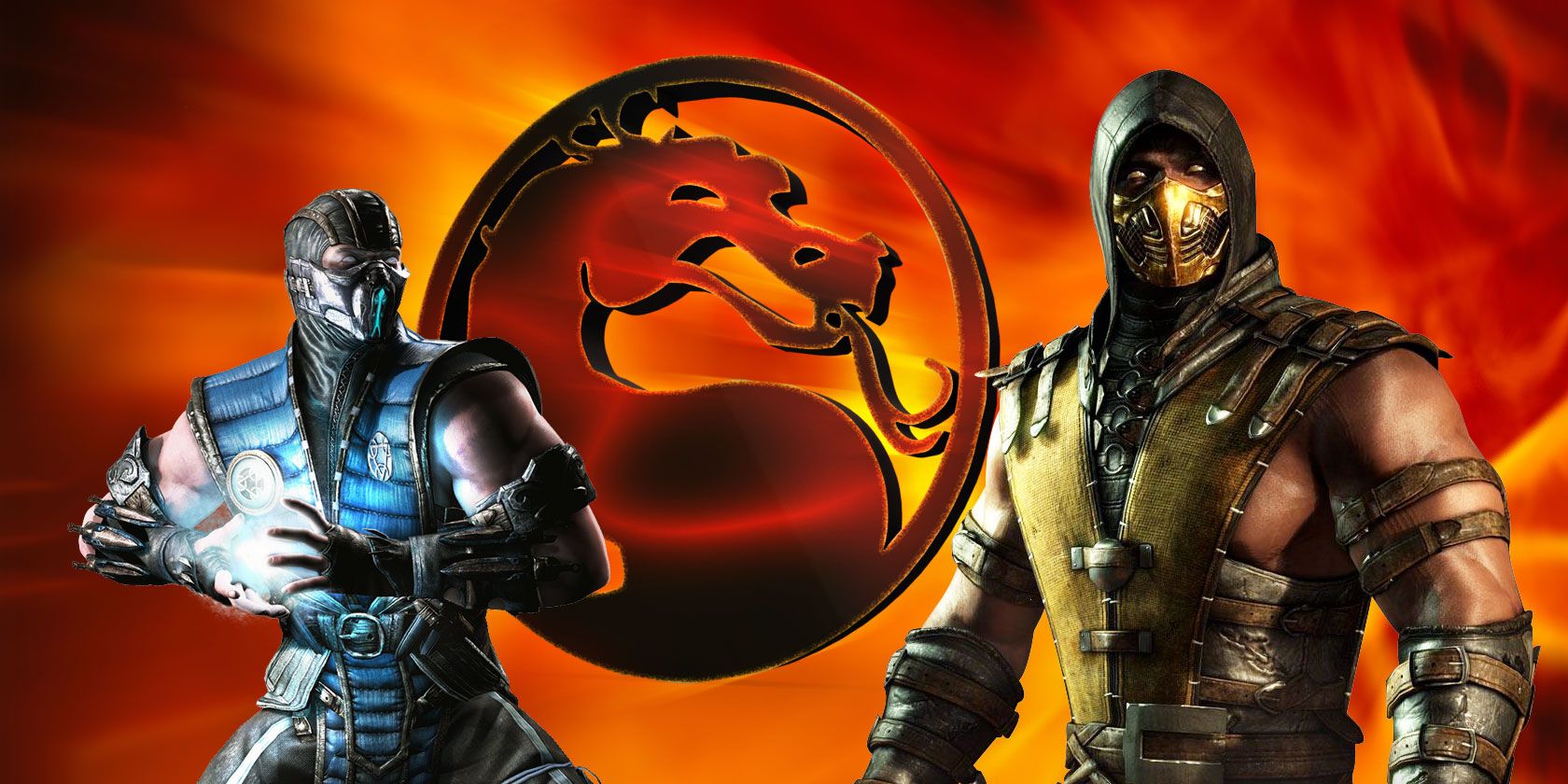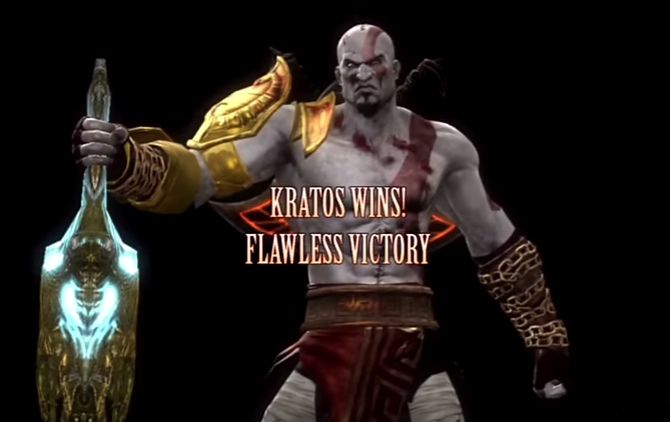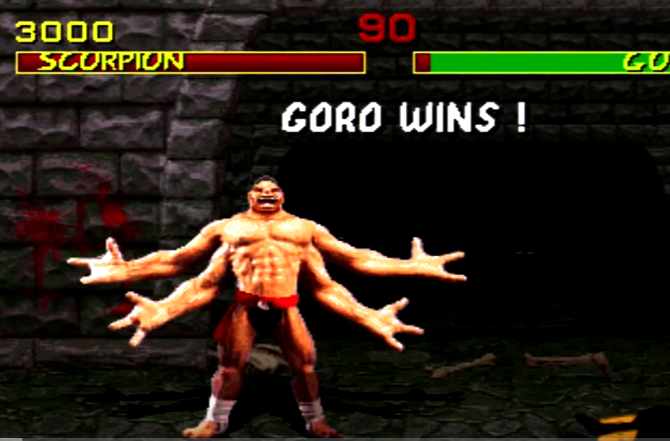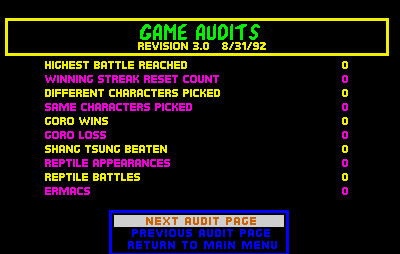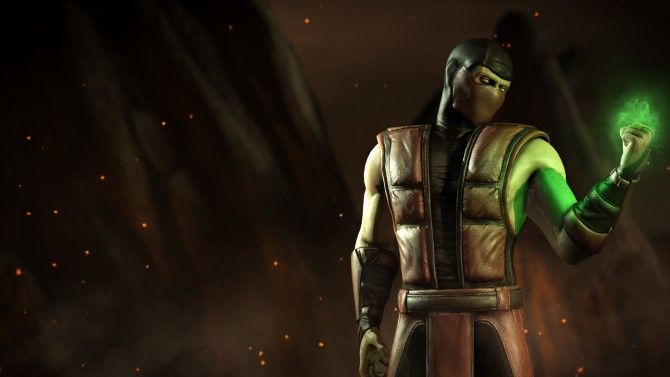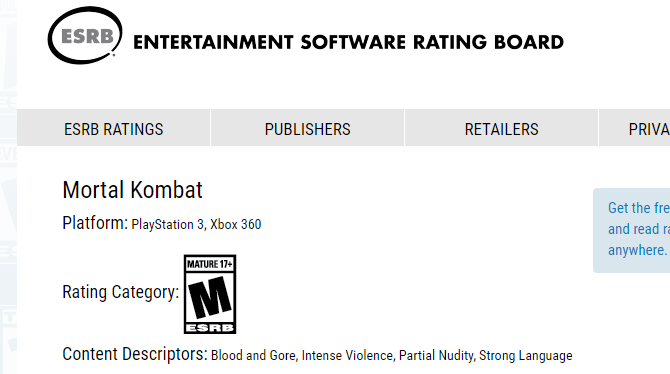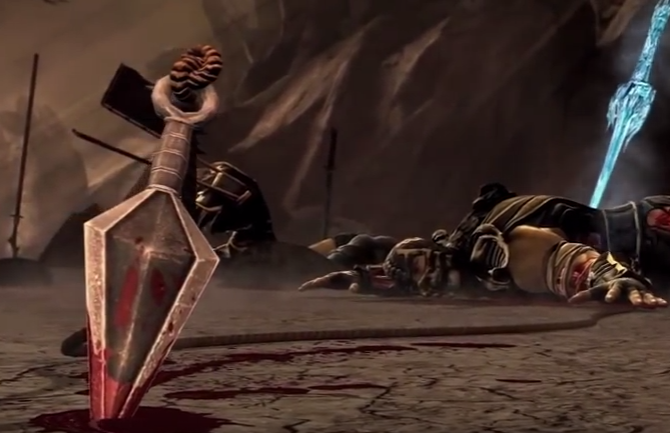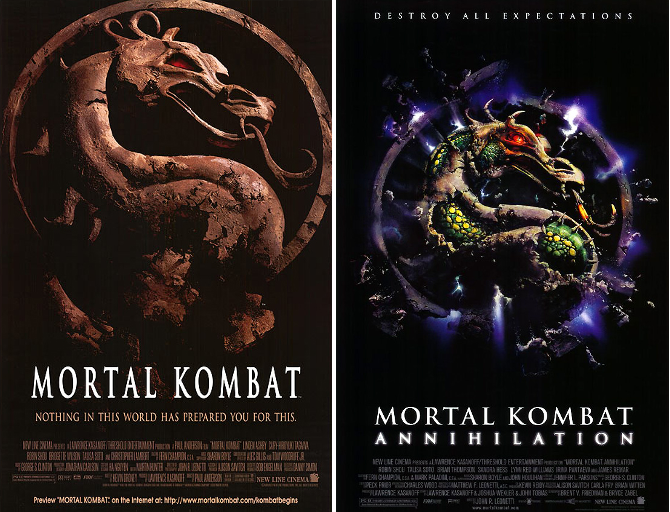Mortal Kombat is one of the most successful and long-running video game series of all time. With 25 games, two major movies, a slew of comic books, and even a Kombat Kon, the series has as much cultural impact as any other game out there -- and maybe more.
Even the most video game-illiterate recognize the name Mortal Kombat, and it's hard to imagine that any serious gamer hasn't played at least a couple entries in the series. But with over two decades of history, there's a lot more going on than flying kicks and scantily-clad ninjas.
Here are 15 fascinating facts, secrets, and stories about the MK universe. Some concern the team behind the games, some cover the games themselves, and others give insight into the cultural importance of Mortal Kombat. Check them out, and let us know your favorite trivia in the comments below!
1. Mortal Kombat Was Developed in 10 Months
It's hard to remember a time when games didn't take huge teams years to develop. But a team of four developed the first MK game in 10 months.
At the core of the team were John Tobias and Ed Boon. Tobias, a former aspiring comic book artist, created the art for arcade hits Smash TV and Total Carnage. In addition to creating Mortal Kombat's signature art style, he wrote the story that would become central to the MK mythos.
Ed Boon got his start as a pinball game programmer before moving into video games. His lead programming on Mortal Kombat helped make the game what it is today. He's still closely involved in the series, and stands as the creative director of many recent MK games. And he's provided voice acting and motion capture for numerous characters.
Artist John Vogel and sound designer Dan Forden completed the development team.
2. Johnny Cage Is Based on Jean-Claude Van Damme
If you look closely at early characters, you can see some interesting influences. Take Johnny Cage, for example. Boon and Tobias originally wanted to digitize Jean-Claude Van Damme for their game. Unfortunately, he was already in talks with another studio for a different fighting game.
His influence is still there, though. In fact, Cage is almost a carbon copy of Van Damme in Bloodsport. He shares his initials, his profession, and one of his signature moves:
Cage isn't the only character inspired by Hollywood. Both Raiden and Shang Tsung took cues from Big Trouble in Little China. The influences are clear in this clip of the Three Storms and Lo Pan:
It's unclear whether Boon and Tobias used Big Trouble directly (though it seems quite likely). But they've mentioned movies of the period as important influences. The films Zu Warriors and The Swordsman, both directed by Tsui Hark, also helped form the eventual design of the games.
3. Scorpion Is the King of Kombat
Depending on who you count, there are between 75 and 85 Mortal Kombat characters. That's a far cry from the original seven in the first game. Of course, Liu Kang, Johnny Cage, Sonya Blade, Kano, Raiden, Scorpion, and Sub-Zero have remained as mainstays in the series. But new characters like Reptile, Kitana, Noob Saibot, Kenshi, and Baraka have become fan favorites as well.
Back in 2013, Dorkly ran a survey to uncover the most popular MK fighter. The survey received over 900,000 votes. Here's the final ranking:
- Scorpion
- Sub Zero II
- Raiden
- Sub Zero I
- Noob Saibot
- Liu Kang
- Toasty Guy (Dan Forden)
- Kung Lao
- Shao Kahn
- Reptile
- Smoke
- Kitana
- Johnny Cage
- Cyrax (my own long-time favorite)
- Ermac
- Baraka
- Goro
- Sonya Blade
- Sektor
- Mileena
Unsurprisingly, Scorpion reigns above the rest. He's one of the most iconic video game characters of all time. His rope-dart move (along with the accompanying "GET OVER HERE!") is similarly famous.
In recent games, the Mortal Kombat series has seen some fun guest appearances, starting with Kratos from God of War (itself an impressively violent video game).
He showed up in the PlayStation 3 and PS Vita versions of Mortal Kombat (2011). After that, the Xenomorph from Alien, the Predator, Freddy Krueger, Friday the 13th's Jason Voorhees, and Leatherface of Texas Chainsaw Massacre have all made appearances.
Though you could argue that Rain, first seen in Ultimate Mortal Kombat 3, was the first notable guest. He is Purple Rain personified (Ed Boon is a huge Prince fan).
4. Goro Was Made of Clay
One aspect that set Mortal Kombat apart from other early-1990s fighting games was its use of digitized sprites. Midway hired real actors to portray the fighters, and captured video frames for each move in their arsenal. They used resulting images to create each character in the game.
Except for Goro. He (and Kintaro, in Mortal Kombat II) was created as a clay model. Then the developers used stop-motion graphics to capture the four-armed behemoth's movements.
Midway used this type of digitization for the first three Mortal Kombat games before it switched to 3D graphics. The real-life actors will always hold a special place in diehard fans' hearts, though. Back in 2014, ten actors from the first three games got together, and even after all those years they're still Kombat-ready.
5. Ermac Started as a Misunderstanding
Although he first appeared in Ultimate Mortal Kombat 3, people buzzed about Ermac much earlier. The red-clad ninja, in fact, was even named after the misunderstanding that spawned these rumors.
The first Mortal Kombat arcade games had a secret menu known as the "game audits menu." This gave statistics about the games, including how many Goro, Shang Tsung, and Reptile fights had taken place. Under these counts was an entry named "ERMACS." Players who accessed this menu understandably thought that ERMACS was another hidden character.
Little did they know that "ermac" is developer-speak for "error macros," which help debug crashes. But the rumor was so persistent that Ermac did finally make an appearance. And he's been a consistent character ever since.
Skarlet, who made a single appearance in Mortal Kombat (2011), also began life as a rumored secret character.
6. Mortal Kombat Didn't Invent the Fatality
Perhaps the MK series' most defining move is the Fatality. But while Mortal Kombat certainly immortalized the Fatality, another game had done it first. Sort of.
Most fighting games end in an opponent getting knocked unconscious. But in 1987's Barbarian: The Ultimate Warrior, a well-timed strike to the head would result in a decapitation and an early end to the fight:
Of course, Mortal Kombat's Fatalities brought the idea to another level entirely. Even in the first game, Fatalities are remarkably brutal. Sub-Zero's spine rip has lived on as one of the most fondly remembered:
Since then, though, Fatalities have increased in number, variation, and brutality. We've seen Animalities, where fighters turn into animals. Stage Fatalities, where a character dies from some part of the background. Babalities, where the opponent is turned into an infant version of their character. Even Friendships, where the winner allows the loser to live.
Today's Fatalities, like those of Mortal Kombat X, bring the brutality to an entirely different level. They are, frankly, stunning in how graphic, creative, and disgusting they are.
Warning: The video below contains extremely graphic violence.
It's easy to see why parents and governmental organizations react the way they do. Speaking of which...
7. The ESRB Was Founded in Response to MK
In the U.S., the Entertainment Software Rating Board assigns ratings to video games, much like the MPAA assigns movie ratings. In 1992, the year Mortal Kombat hit the arcades, senators held hearings on violence in video games. MK was one of the games discussed in these hearings.
Of course, it wasn't only MK that prompted the formation of the ESRB. A game called Night Trap was also at the center of discussion during the hearings. But Mortal Kombat would stay controversial for years. Germany banned the games for the next decade. They were censored in Japan. And the 2011 reboot was banned in Australia, Germany, and South Korea.
Ads for the game have also received censorship. Studies on video game violence examine the series. It's blamed for real-life acts of violence. Mortal Kombat is brought up in almost every discussion of video game violence, and it continues to be cited (even by President Clinton during his tenure) as a malign influence on society.
And that, of course, has helped sell more games. Whether you believe that Mortal Kombat is corrupting modern youth or not, there's no denying that it has played a pivotal role in our perception of video games -- for better or worse.
8. Not Every MK Game Is a Fighting Game
There's fighting in every MK game, but that doesn't make each entry a fighting game. Mortal Kombat Mythologies: Sub-Zero, for example, is a side-scroller in which the player takes Sub-Zero on a quest to find a magical amulet. The controls are very much like the regular MK games, so it feels a bit like a player-versus-enemy version of the classic formula.
It sounds like a decent concept, but it was widely panned. As was the action-adventure follow up, Special Forces. This game focused on Jax and his pursuit of Kano. It's considered as one of the worst entries in the entire MK universe. A quick look at the intro tells you all you need to know:
Shaolin Monks, which tells the story of Liu Kang and Kung Lao trying to thwart Shang Tsung's plans, fared much better. It was positively received, and has been the most successful action-adventure game to come out of Mortal Kombat. You can see some of the platforming gameplay style, as well as the combat system and fatalities, in this video:
Surprisingly, not every MK game is even a video game. There have been two collectible card games, Mortal Kombat Kard Game and Epic Battles. Discussion has surfaced of a miniatures game being released in 2017, but the lack of news isn't promising.
9. There Are 8 Minigames in the Mortal Kombat Series
If you played the original Mortal Kombat, you probably remember the "Test Your Might" minigame, where you had to mash buttons to smash through wood, stone, steel, ruby, or diamond. But there have been many others.
Test Your Sight is a shell game where you have to keep track of a hidden object moving around the screen. Test Your Balance is a PS Vita-only game that sees players tilting the handheld back and forth to balance. And Test Your Slice was another portable minigame reminiscent of Fruit Ninja.
There are some surprising and hilarious minigames in the series, too. Motor Kombat is basically Mario Kart with Mortal Kombat characters (complete with Fatalities). Chess Kombat is a game of chess with special character powers. Puzzle Kombat is a Mortal Kombat-themed game of Tetris, much like Street Fighter's Super Puzzle Fighter.
10. The MK Mythology Is Astonishingly Deep
If you have only a passing familiarity with Mortal Kombat, you might think that each game is a standalone fighting game with a bit of story thrown in here and there. But you'd be quite wrong. The MK universe has a huge mythology that has carried on through the games and is continually in development. What began as a simple tournament to save Earthrealm from an invasion by Outworld has become a tiny piece of a puzzle that spans all of time.
In fact, the mythology is so convoluted that we're currently in a sort of alternate timeline. After the events of Armageddon, every MK fighter was left dead.
The only two left were Raiden and Shao Kahn, locked seemingly forever in battle. Just before Kahn is able to strike a killing blow, Raiden sends a message to himself in the past, warning him of the events to come.
That triggers what is essentially a reboot in Mortal Kombat (2011). But the events are subtly different, and create a new story. And players learn that these events may have been orchestrated by other nefarious forces.
I'm telling you, it gets crazy. If you want to read everything there is to read about the Mortal Kombat mythology, check out the storyline from the Mortal Kombat wiki. You'll learn all sorts of facts about the series.
For example, did you know that there are actually two Sub-Zeroes? And that the first one, after death, became Noob Saibot? Or that Sektor, Cyrax, and Smoke are part of the Lin Kuei clan that underwent a cyborg transformation? Or that Reptile is a member of an ancient dinosaur-like race that previously inhabited Earth, but was moved to the realm of Zaterra by the Elder Gods?
11. Mortal Kombat X References the MK Movie
If you've seen the first Mortal Kombat movie, you'll probably remember the fight between Johnny Cage and Goro. The dialogue, the fight itself, and Goro's ultimate ending are… well, "cheesy" doesn't quite cover it. And it looks like the team behind Mortal Kombat X agrees. There are a couple references to this movie scene in the game:
In holding with previous titles, there are all sorts of entertaining references if you're paying attention.
Cassie Cage, for example, always removes a pair of white earbuds before she fights. If you listen closely, you can hear that she's listening to music from MK3. When you play through Klassic mode with Cassie, you'll also find a reference to a nearly forgotten character from Deception. And if you pull off her social media Fatality (which is arguable one of the most disgusting in the entire canon), you'll find all sorts of references.
This builds on a long legacy of secret features. Most notably, the early games included hidden characters that you could fight. By performing specific actions, you face off against Reptile in Mortal Kombat; Smoke, Noob Saibot, and Jade in Mortal Kombat II; and many other characters in other games. More recent entries let you battle against Klassic versions of characters.
12. The "Toasty!" Guy Is Mortal Kombat's Sound Designer
In many Mortal Kombat games, landing a particularly solid uppercut or a specific fatality will reward the player with a face sliding into the screen, saying "Toasty!" in a falsetto voice, and disappearing again. No explanation is ever given for this strange occurrence.
The guy who appears is Dan Forden, one of the original four-man crew that created Mortal Kombat. "Toasty!" came from a long-running joke between Dan and Ed Boon. When they were playing Super High Impact, an American football video game, Dan would say "I predict toast" (as in, "you'll be toast") as the players lined up for the next play.
That eventually became "I predict toasty," and someone suggested they put it in the game. The rest is history.
And if you pull off the right moves in the right games, you'll also find "Frosty!", "Crispy!", and "Toasty 3D!"
13. The Two Movies Were Only the Beginning
If you're a Mortal Kombat fan, there's a good chance you've seen the two full-length movies to come out of the series. Both Mortal Kombat and Mortal Kombat: Annihilation were flops. The former has a score of 58 on Metacritic, while the latter managed to pull down an impressively abysmal 11. (It's hard to make a good video game movie, but that is terrible.)
Since the games are often solidly in the 80s, that's a jarring drop.
But those movies aren't the only cinematic MK entries. There's also an animated TV show (Defenders of the Realm), a live-action prequel TV show (Conquest), an animated prequel film (The Journey Begins), a short film (Rebirth), and a live-action prequel web series (Legacy).
Of all of these, Rebirth and Legacy are probably the most worth watching (though the other movies do have cult followings). Rebirth was directed by Kevin Tancharoen, who made the film in an effort to convince Warner Bros. to move ahead on a Mortal Kombat reboot -- with himself at the helm. Rebirth served as the basis for Legacy, which details an alternate MK universe.
If nothing else, it's worth watching to see a different, interesting take on the character origin stories.
14. Mortal Kombat Has Been in Print
In a jump completely off the screen, you can also find Mortal Kombat in print. There are a number of comics available, most notably the series released in tandem with Mortal Kombat X. The series actually got pretty good reviews, both for the storytelling and the art.
Other comics have seen print as well, but none as popular as MKX. Goro: Prince of Pain, and Mortal Kombat: Blood and Thunder are still available on Amazon, and there are likely a few other entries out there.
There are a few novels, too, but they're rather unexciting. One novelization of the first game introduced a number of characters that were never heard from again. A few movie novelizations also exist. Will we see more MK novels in the future? We can only hope.
15. A New Band Was Formed to Create the Soundtrack
If you think of the Mortal Kombat theme song, you probably think of a techno track in which a guy shouts "Mortal Kombat!" a few times. That track was written by The Immortals, an electronic group made up of members of Lords of Acid.
Praga Khan and Olivier Adams wrote and performed a 10-track album to go along with the game's release on consoles. None of the music was featured in the game, but "Techno Syndrome (Mortal Kombat)" featured prominently in the movie.
The album consists of one song for each playable character, one for Goro, and two Mortal Kombat-themed tracks.
A number of other Mortal Kombat-related albums have been released, including soundtracks, scores, and another electronic album called Songs Inspired by the Warriors. I actually really dig "Mileena's Theme" from that album:
An Immortal Tale for the Ages
These 15 facts and stories barely scratch the surface of what Mortal Kombat is and has done. Its legacy, both in story and cultural impact, can't be condensed into a single article.
The dozens of characters have become icons of the video game world. Fatalities have scared the wits out of parents and watchdog organizations. The lore has become an odyssey on par with some novel series. Boundaries are continually challenged by the violence.
Mortal Kombat is one of the most important titles in video game history, and there are stacks of fun trivia and interesting stories. I sincerely hope you've enjoyed this look at some of my favorite facts about this iconic series.
Interested in reading another in-depth look at an iconic franchise? Check out the legacy of Lara Croft from the Tomb Raider games.
What are your favorite pieces of Mortal Kombat trivia? Which of the above did you find most interesting? And, most importantly, who is your favorite MK fighter? Share your thoughts in the comments below!

